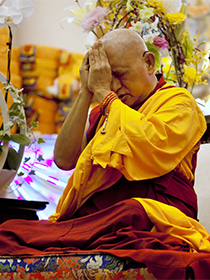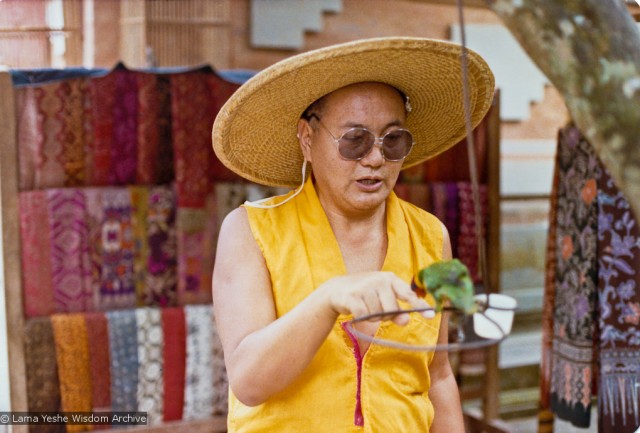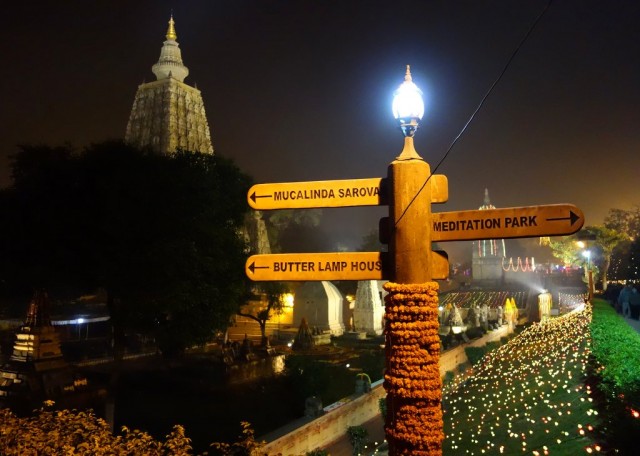- Home
- FPMT Homepage
Foundation for the Preservation of the Mahayana Tradition
The FPMT is an organization devoted to preserving and spreading Mahayana Buddhism worldwide by creating opportunities to listen, reflect, meditate, practice and actualize the unmistaken teachings of the Buddha and based on that experience spreading the Dharma to sentient beings. We provide integrated education through which people’s minds and hearts can be transformed into their highest potential for the benefit of others, inspired by an attitude of universal responsibility and service. We are committed to creating harmonious environments and helping all beings develop their full potential of infinite wisdom and compassion. Our organization is based on the Buddhist tradition of Lama Tsongkhapa of Tibet as taught to us by our founders Lama Thubten Yeshe and Lama Thubten Zopa Rinpoche.
- Willkommen
Die Stiftung zur Erhaltung der Mahayana Tradition (FPMT) ist eine Organisation, die sich weltweit für die Erhaltung und Verbreitung des Mahayana-Buddhismus einsetzt, indem sie Möglichkeiten schafft, den makellosen Lehren des Buddha zuzuhören, über sie zur reflektieren und zu meditieren und auf der Grundlage dieser Erfahrung das Dharma unter den Lebewesen zu verbreiten.
Wir bieten integrierte Schulungswege an, durch denen der Geist und das Herz der Menschen in ihr höchstes Potential verwandelt werden zum Wohl der anderen – inspiriert durch eine Haltung der universellen Verantwortung und dem Wunsch zu dienen. Wir haben uns verpflichtet, harmonische Umgebungen zu schaffen und allen Wesen zu helfen, ihr volles Potenzial unendlicher Weisheit und grenzenlosen Mitgefühls zu verwirklichen.
Unsere Organisation basiert auf der buddhistischen Tradition von Lama Tsongkhapa von Tibet, so wie sie uns von unseren Gründern Lama Thubten Yeshe und Lama Thubten Zopa Rinpoche gelehrt wird.
- Bienvenidos
La Fundación para la preservación de la tradición Mahayana (FPMT) es una organización que se dedica a preservar y difundir el budismo Mahayana en todo el mundo, creando oportunidades para escuchar, reflexionar, meditar, practicar y actualizar las enseñanzas inconfundibles de Buda y en base a esa experiencia difundir el Dharma a los seres.
Proporcionamos una educación integrada a través de la cual las mentes y los corazones de las personas se pueden transformar en su mayor potencial para el beneficio de los demás, inspirados por una actitud de responsabilidad y servicio universales. Estamos comprometidos a crear ambientes armoniosos y ayudar a todos los seres a desarrollar todo su potencial de infinita sabiduría y compasión.
Nuestra organización se basa en la tradición budista de Lama Tsongkhapa del Tíbet como nos lo enseñaron nuestros fundadores Lama Thubten Yeshe y Lama Zopa Rinpoche.
A continuación puede ver una lista de los centros y sus páginas web en su lengua preferida.
- Bienvenue
L’organisation de la FPMT a pour vocation la préservation et la diffusion du bouddhisme du mahayana dans le monde entier. Elle offre l’opportunité d’écouter, de réfléchir, de méditer, de pratiquer et de réaliser les enseignements excellents du Bouddha, pour ensuite transmettre le Dharma à tous les êtres. Nous proposons une formation intégrée grâce à laquelle le cœur et l’esprit de chacun peuvent accomplir leur potentiel le plus élevé pour le bien d’autrui, inspirés par le sens du service et une responsabilité universelle. Nous nous engageons à créer un environnement harmonieux et à aider tous les êtres à épanouir leur potentiel illimité de compassion et de sagesse. Notre organisation s’appuie sur la tradition guéloukpa de Lama Tsongkhapa du Tibet, telle qu’elle a été enseignée par nos fondateurs Lama Thoubtèn Yéshé et Lama Zopa Rinpoché.
Visitez le site de notre Editions Mahayana pour les traductions, conseils et nouvelles du Bureau international en français.
Voici une liste de centres et de leurs sites dans votre langue préférée
- Benvenuto
L’FPMT è un organizzazione il cui scopo è preservare e diffondere il Buddhismo Mahayana nel mondo, creando occasioni di ascolto, riflessione, meditazione e pratica dei perfetti insegnamenti del Buddha, al fine di attualizzare e diffondere il Dharma fra tutti gli esseri senzienti.
Offriamo un’educazione integrata, che può trasformare la mente e i cuori delle persone nel loro massimo potenziale, per il beneficio di tutti gli esseri, ispirati da un’attitudine di responsabilità universale e di servizio.
Il nostro obiettivo è quello di creare contesti armoniosi e aiutare tutti gli esseri a sviluppare in modo completo le proprie potenzialità di infinita saggezza e compassione.
La nostra organizzazione si basa sulla tradizione buddhista di Lama Tsongkhapa del Tibet, così come ci è stata insegnata dai nostri fondatori Lama Thubten Yeshe e Lama Zopa Rinpoche.
Di seguito potete trovare un elenco dei centri e dei loro siti nella lingua da voi prescelta.
- 欢迎 / 歡迎
简体中文
“护持大乘法脉基金会”( 英文简称:FPMT。全名:Foundation for the Preservation of the Mahayana Tradition) 是一个致力于护持和弘扬大乘佛法的国际佛教组织。我们提供听闻,思维,禅修,修行和实证佛陀无误教法的机会,以便让一切众生都能够享受佛法的指引和滋润。
我们全力创造和谐融洽的环境, 为人们提供解行并重的完整佛法教育,以便启发内在的环宇悲心及责任心,并开发内心所蕴藏的巨大潜能 — 无限的智慧与悲心 — 以便利益和服务一切有情。
FPMT的创办人是图腾耶喜喇嘛和喇嘛梭巴仁波切。我们所修习的是由两位上师所教导的,西藏喀巴大师的佛法传承。
繁體中文
護持大乘法脈基金會”( 英文簡稱:FPMT。全名:Found
ation for the Preservation of the Mahayana Tradition ) 是一個致力於護持和弘揚大乘佛法的國際佛教組織。我們提供聽聞, 思維,禪修,修行和實證佛陀無誤教法的機會,以便讓一切眾生都能 夠享受佛法的指引和滋潤。 我們全力創造和諧融洽的環境,
為人們提供解行並重的完整佛法教育,以便啟發內在的環宇悲心及責 任心,並開發內心所蘊藏的巨大潛能 — 無限的智慧與悲心 – – 以便利益和服務一切有情。 FPMT的創辦人是圖騰耶喜喇嘛和喇嘛梭巴仁波切。
我們所修習的是由兩位上師所教導的,西藏喀巴大師的佛法傳承。 察看道场信息:
- FPMT Homepage
- News/Media
-
- Study & Practice
-
-
- About FPMT Education Services
- Latest News
- Programs
- New to Buddhism?
- Buddhist Mind Science: Activating Your Potential
- Heart Advice for Death and Dying
- Discovering Buddhism
- Living in the Path
- Exploring Buddhism
- FPMT Basic Program
- FPMT Masters Program
- FPMT In-Depth Meditation Training
- Maitripa College
- Lotsawa Rinchen Zangpo Translator Program
- Universal Education for Compassion & Wisdom
- Online Learning Center
-
- Prayers & Practice Materials
- Overview of Prayers & Practices
- Full Catalogue of Prayers & Practice Materials
- Explore Popular Topics
- Benefiting Animals
- Chenrezig Resources
- Death & Dying Resources
- Lama Chopa (Guru Puja)
- Lama Zopa Rinpoche: Compendium of Precious Instructions
- Lama Zopa Rinpoche: Life Practice Advice
- Lama Zopa Rinpoche Practice Series
- Lamrim Resources
- Mantras
- Prayer Book Updates
- Purification Practices
- Sutras
- Thought Transformation (Lojong)
- Audio Materials
- Dharma Dates - Tibetan Calendar
- Translation Services
- Publishing Services
- Ways to Offer Support
- Prayers & Practice Materials
-
- Teachings and Advice
- Find Teachings and Advice
- Lama Zopa Rinpoche Advice Page
- Lama Zopa Rinpoche: Compendium of Precious Instructions
- Lama Zopa Rinpoche Video Teachings
- ༧སྐྱབས་རྗེ་བཟོད་པ་རིན་པོ་ཆེ་མཆོག་ནས་སྩལ་བའི་བཀའ་སློབ་བརྙན་འཕྲིན།
- Podcasts
- Lama Yeshe Wisdom Archive
- Buddhism FAQ
- Dharma for Young People
- Resources on Holy Objects
- Teachings and Advice
-
-
*If a menu item has a submenu clicking once will expand the menu clicking twice will open the page.
-
-
- Centers
-
- Teachers
-
- Projects
-
-
-
-
*If a menu item has a submenu clicking once will expand the menu clicking twice will open the page.
-
-
- FPMT
-
-
-
-
-
No matter whether you are a believer or a non-believer, religious or not religious, a Christian, Hindu, or a scientist, black or white, an Easterner or a Westerner, the most important thing to know is your own mind and how it works.
Lama Thubten Yeshe
-
-
-
- Shop
-
-
-
The Foundation Store is FPMT’s online shop and features a vast selection of Buddhist study and practice materials written or recommended by our lineage gurus. These items include homestudy programs, prayers and practices in PDF or eBook format, materials for children, and other resources to support practitioners.
Items displayed in the shop are made available for Dharma practice and educational purposes, and never for the purpose of profiting from their sale. Please read FPMT Foundation Store Policy Regarding Dharma Items for more information.
-
-
Study & Practice News
25
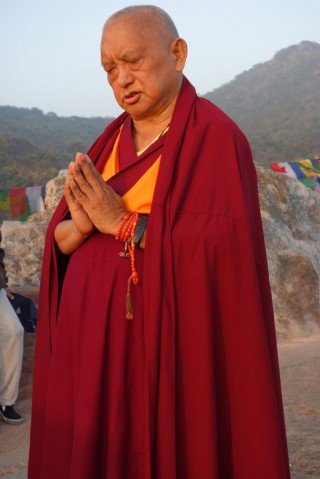
Lama Zopa Rinpoche does prostrations at Vulture’s Peak, the site of Buddha’s first teaching, India, February 2, 2014. Photo by Ven. Roger Kunsang.
The most important thing for this life’s happiness, especially for the sentient beings you meet, is to have the thought:
I am the servant and they are the masters. I am the servant and they are the kings. They are the masters and I am like the dog. Sentient beings are the ones from whom I have received all my happiness. They are the dearest and most kind.
They are the ones from who all opportunities come, in relation to whom I have the opportunity to purify all my negative karma, create all the merit, and attain enlightenment. So they are the kindest of all. I should use my body, speech and mind to serve others, especially the people of the [Dharma] center, as well as all the animals and insects.
This is also the attitude one should have with one’s family, or if you are a teacher or the leader of a company, etc.
– Lama Zopa Rinpoche, from Service as a Path to Enlightenment, from FPMT Education Services
Lama Zopa Rinpoche is the spiritual director of the Foundation for the Preservation of Mahayana Tradition (FPMT), an organization dedicated to preserving Mahayana Buddhism through offering the Buddha’s authentic teachings and to facilitating reflection, meditation, practice and the opportunity to actualize and directly experience the Buddha’s teachings. Sign up to receive news and updates.
- Tagged: lama zopa rinpoche, mandala, service
- 0
24
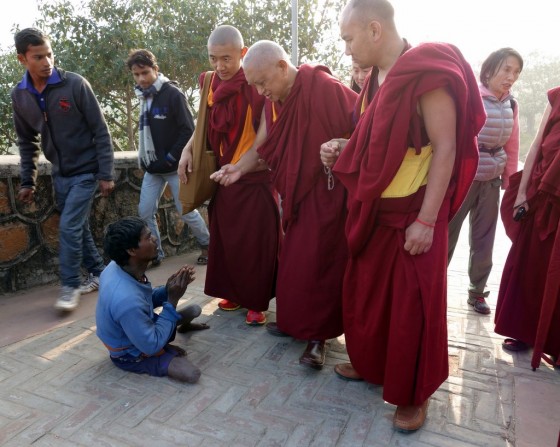
Lama Zopa Rinpoche offering money to the beggars on the way up to Vulture’s Peak. Rinpoche asks them to recite OM MANI PADME HUM, India, February 2, 2014. Photo by Ven. Roger Kusang.
“Normally, worldly business people think that the best way to invest is by doing business. But that is only certain when you make a profit. Until then, it’s uncertain. My own feeling is the most reliable investment is to offer money to monasteries and offer charity to sentient beings. This way, even though the result of the investment, the income, doesn’t appear right now, it is 100% certain that it will be received in the near future.
“The result of karma is that not only do you receive the income back, but the result manifests in various forms, various instances of happiness. The karmic result is so much more than the profit you would get from business. The result of karma is expandable, not just in one lifetime, but hundreds of thousands of lifetimes, and can also expand up to enlightenment.
“This way, there is no loss at all. In the case of business, there is uncertainty until you actually make a profit. I feel this way, investing by making charity or offerings, is more satisfying. Then, not only do you get the result of whatever you achieve, but others get the benefit also. This is something to think about.”
– Lama Zopa Rinpoche, from “Investing for Real Profit,” on the Lama Yeshe Wisdom Archive
Lama Zopa Rinpoche is the spiritual director of the Foundation for the Preservation of Mahayana Tradition (FPMT), an organization dedicated to preserving Mahayana Buddhism through offering the Buddha’s authentic teachings and to facilitating reflection, meditation, practice and the opportunity to actualize and directly experience the Buddha’s teachings. Sign up to receive news and updates.
- Tagged: generosity, lama zopa rinpoche, mandala
- 0
19
Tara, The Liberator, is a completely enlightened buddha who had previously promised to appear, after enlightenment, in the form of a female bodhisattva for the benefit of all beings. Her primary activity is to protect from the eight fears. Tara or simply Drol-ma in Tibetan, is one of the most widely venerated deities in Tibet. Tara represents the miraculous activities of all buddhas. In myth she is born from Chenrezig’s tears of compassion. There are innumerable manifestations of Tara arising according to the needs of others, such as the dynamic Green Tara who quickly overcomes obstacles and saves beings in dangerous situations.
FPMT Education Services is pleased to announce a revised Short Practice of Green Tara. This practice includes the short sadhana, commentary from Lama Zopa Rinpoche, and three versions of Praises to the Twenty-One Taras. A Kriya Tantra empowerment of Green Tara is needed to practice this sadhana in full. However, one can do this practice without such an empowerment as long as one does not generate oneself as the deity. If one does not have the empowerment, one can do the self-generation practice at the crown of one’s head.
- Tagged: 21 taras, fpmt education services
18
‘You Have to Find Your Own Truth’
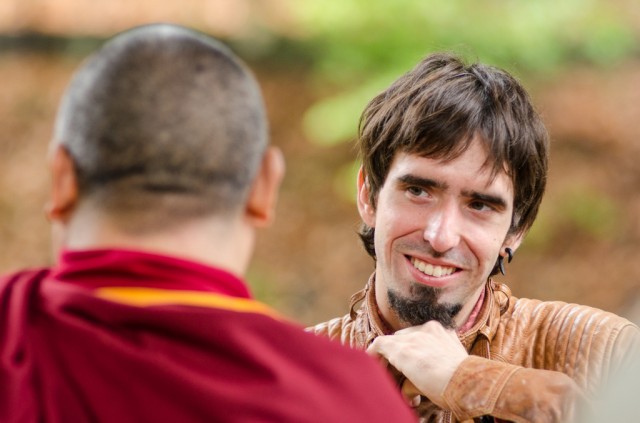
Tenzin Ösel Hita with Ven. Pemba Sherpa in the, Land of Medicine Buddha, California, September 21, 2013. Photo by Chris Majors.
“Each person has to find their own way of understanding and what works for them because nobody can really come and say, ‘Okay, I found the truth. Take it.’ It may be his truth, but it doesn’t necessarily mean it’s your truth. You have to find your own truth.”
– Tenzin Ösel Hita, from “Teachings from the 45th Kopan Course,” given in 2012 at Kopan Monastery, on the Lama Yeshe Wisdom Archive
More information, photos and updates about Tenzin Ösel Hita, the recognized reincarnation of FPMT founder Lama Yeshe, can be found on Ösel’s hompage. If you’d like to support Ösel’s educational endeavors, visit the Big Love Fund.
- Tagged: mandala, tenzin osel hita
- 0
17
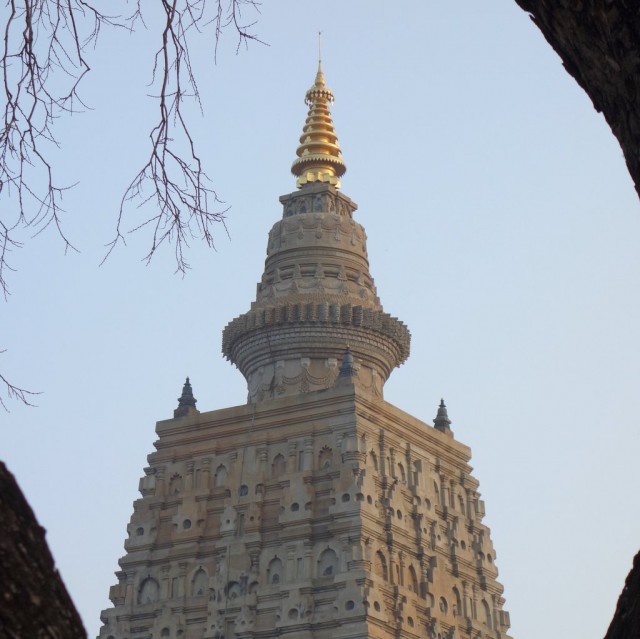
The Mahabodhi Stupa with gold offering on the pinnacle, Bodhgaya, India, January 2014. Photo by Ven. Roger Kunsang.
“Every time you look at holy objects – pictures of the Buddha, statues, scriptures, stupas – they plant the seed of liberation and enlightenment in your mental continuum. So every time you look at them they purify your mind. They plant the seed of enlightenment, which includes all the causes to achieve enlightenment. How? When you look at them they plant a seed or positive imprint on your mental continuum so that later when you meet Buddhadharma, either in this life or in future lives, you are able to understand the words and the meaning of the teachings. From that, you are able to practice the meaning of the Dharma you have understood, which causes you to cease the gross and subtle defilements by actualizing the path and then your mental continuum becomes omniscient mind. This is what is meant when we say that by seeing holy objects it plants the seed of enlightenment on the mind – it contains the whole path from guru devotion and the three principles up to the two stages of tantra and enlightenment. Seeing holy objects makes us actualize all of this as a result. This is the effect we get from seeing them and this is how they cause us to achieve enlightenment.”
– Lama Zopa Rinpoche, from “Why Holy Object Are Precious and Wish-fulfilling,” posted on fpmt.org
Learn more about Lama Zopa Rinpoche, spiritual director of the Foundation for the Preservation of Mahayana Tradition (FPMT), and Rinpoche’s vision for a better world. Sign up to receive news and updates.
- Tagged: holy objects, lama zopa rinpoche, mandala
- 0
13
‘True Dharma Practitioners Welcome Trouble’
“If you’re not tested, you take teaching after teaching and think you’re OK, but when you’re confronted with a difficult situation, it’s possible that you’ll find you’re not OK at all. So that’s why true Dharma practitioners welcome trouble. It gives them a chance to see if what they’ve been studying works or not, a chance to transform suffering into happiness. Otherwise you just go blithely along, completely out of touch with reality, thinking you’re OK when you’re not, because you haven’t actually been practicing Dharma at all.”
– Lama Yeshe, from “True Dharma Practitioners Welcome Trouble” on the Lama Yeshe Wisdom Archive
Learn more about FPMT founder Lama Yeshe on his homepage on fpmt.org. Many more teachings from Lama Yeshe are freely available from Lama Yeshe Wisdom Archive.
- Tagged: lama yeshe, mandala
- 0
11
“I think you are very fortunate to be able to come to Bodhgaya, where a thousand buddhas will descend, place their holy feet, display holy deeds, and achieve enlightenment. Guru Shakyamuni Buddha is the fourth of the thousand buddhas. The rest of the buddhas will descend here and will also display the twelve deeds, and the holy deed, achieving enlightenment.
“There is a place in Bodhgaya called the Vajra Seat. This ground is blessed. Before becoming enlightened, Buddha blessed this ground so it would not be destroyed or cracked, but would stay firm. It is said that there are no earthquakes in Bodhgaya because it is blessed by Buddha, and also that this will be the last place to exist when the world ends.
“On top of receiving the blessings from this holy place, where already four buddhas have descended, so many other enlightened beings, yogis, and great bodhisattvas have come here to do pilgrimage, to pray, and to bless this place.
“It is very good while you’re here to make as many circumambulations and prayers as you can under the bodhi tree and inside the temple in front of the Buddha. Even though it is said that the bodhi tree has been cut down three times, it has the same roots as at the time of the Buddha. …”
— Lama Zopa Rinpoche, advice given to a group of Russian students on the benefits of doing practice in Bodhgaya from the “Lama Zopa Rinpoche Online Advice Book” on the Lama Yeshe Wisdom Archive
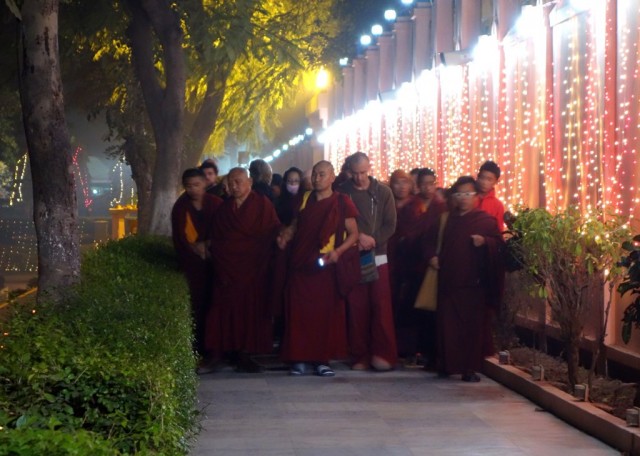
Lama Zopa Rinpoche doing korwa at the Mahabodhi Temple, Bodhgaya, India, January 2014. Photo by Ven. Roger Kunsang.
More information, photos and updates about FPMT spiritual director Lama Zopa Rinpoche can be found on Rinpoche’s homepage. If you’d like to receive news of Lama Zopa Rinpoche via email, sign up to Lama Zopa Rinpoche News.
- Tagged: bodhgaya, lama zopa rinpoche, mandala, pilgrimage
- 0
10
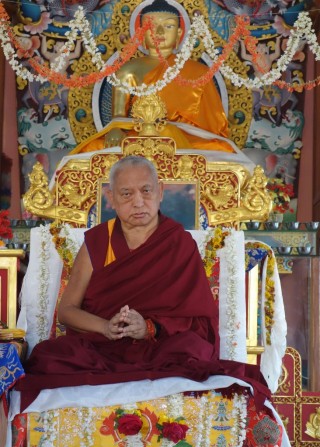
Lama Zopa Rinpoche teaching and giving oral transmissions to children from Ladakh at Sera Monastery, India, January 2014. Photo by Ven. Roger Kunsang.
“Your inspiration to practice Dharma is the most important thing in your life. Without Dharma there is no happiness, and there is no question that you can’t achieve enlightenment. You can’t liberate sentient beings from all the sufferings and causes and bring them to enlightenment. You can’t even achieve for yourself total liberation from samsara. All the happiness of future lives has to come from Dharma because it comes from past good karma, that which is Dharma. So, without Dharma, one can’t have any success in this life: success in business, marriage, or any happiness you want.
“So, the best thing to help others is Dharma, and the best thing to help oneself is Dharma. Among the best, most important things in this life is to meditate on the lam-rim and to have realizations –to complete the path to enlightenment and to make yourself fully qualified to liberate numberless sentient beings who are obscured and suffering and to bring them to peerless happiness and full enlightenment.”
– Lama Zopa Rinpoche, from “Advice for New Students” on the Lama Yeshe Wisdom Archive
More information, photos and updates about FPMT spiritual director Lama Zopa Rinpoche can be found on Rinpoche’s homepage. If you’d like to receive news of Lama Zopa Rinpoche via email, sign up to Lama Zopa Rinpoche News.
- Tagged: lama zopa rinpoche, mandala
- 0
7
‘Ultimately, the Real Guru Is Inside Ourselves’
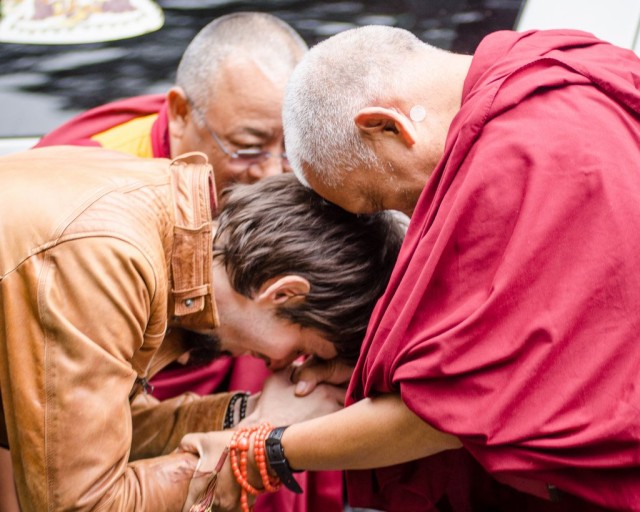
Tenzin Ösel Hita greeting Lama Zopa Rinpoche with Ven. Pemba Sherpa in the background, Land of Medicine Buddha, California, September 21, 2013. Photo by Chris Majors.
“Ultimately, the real guru is inside ourselves. We are our own guru, we are by ourselves. So it’s up to us to walk the path, always. We are born by ourselves in this body, and we will die by ourselves. There will be nobody who will take care of us afterwards in the sense like holding our hands and carrying us. We have to walk the path by ourselves.”
– Tenzin Ösel Hita, from “Teachings from the 45th Kopan Course,” given in 2012 at Kopan Monastery, on the Lama Yeshe Wisdom Archive
More information, photos and updates about Tenzin Ösel Hita, the recognized reincarnation of FPMT founder Lama Yeshe, can be found on Ösel’s hompage. If you’d like to support Ösel’s educational endeavors, visit the Big Love Fund.
- Tagged: mandala, tenzin osel hita
- 0
6
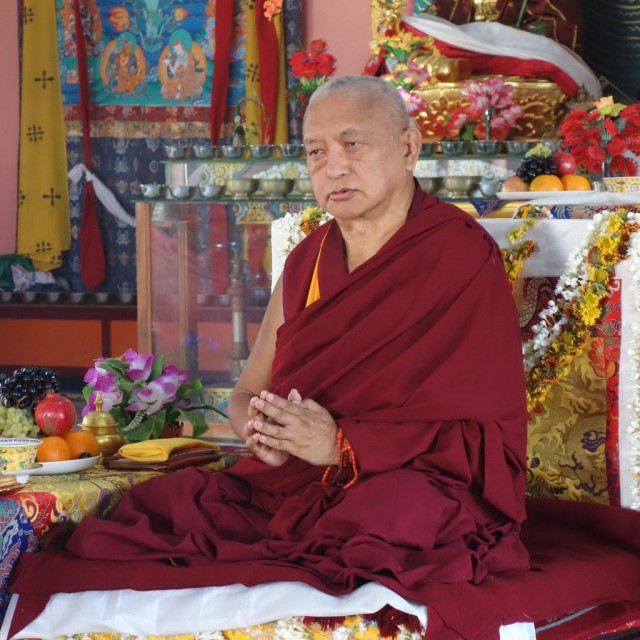
Lama Zopa Rinpoche teaching and giving oral transmissions to children from Ladakh at Sera Monastery, India, January 2014. Photo by Ven. Roger Kunsang.
“The Destroyer Qualified Gone Beyond One (Bhagawan) said, ‘The bodhisattva does not follow many Dharmas. The bodhisattva holds one Dharma well and realizes it well. The whole Buddhadharma will be in the hand of that person.’ What is that Dharma? It is great COMPASSION. (From the Chenrezig Sutra Well-Condensed Dharma.)”
– Lama Zopa Rinpoche from “Compassion Is of the Utmost Need”
Lama Zopa Rinpoche is the spiritual director of the Foundation for the Preservation of Mahayana Tradition (FPMT), an organization dedicated to preserving Mahayana Buddhism through offering the Buddha’s authentic teachings and to facilitating reflection, meditation, practice and the opportunity to actualize and directly experience the Buddha’s teachings. Sign up to receive news and updates.
- Tagged: lama zopa rinpoche, mandala
- 0
3
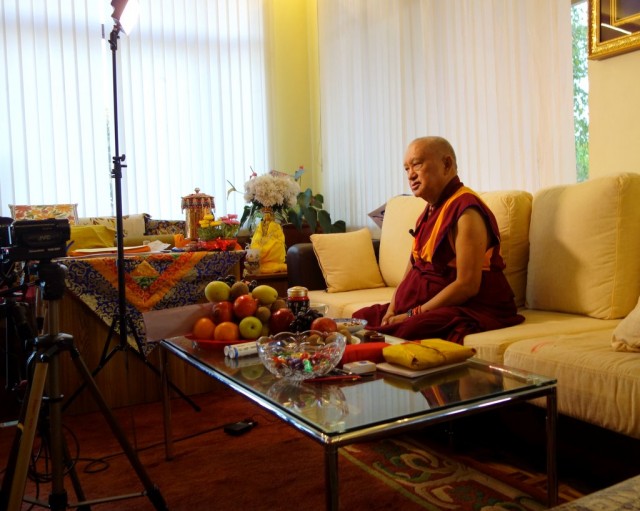
Lama Zopa Rinpoche explaining in a video interview the path to enlightenment and how fortunate all are, Osel Labrang, Sera Je Monastery, India, January 2014. Photo by Ven. Roger Kunsang.
“Think, ‘How fortunate I am that I am able to offer (service) in the present, in the future,’ so rather than taking it as a burden, follow the bodhisattvas’ path. Follow the bodhisattvas’ attitude – that’s the way to achieve enlightenment. So in that way you achieve enlightenment very fast, without taking many eons. So the stronger compassion you have, how much good heart you have, you are able to achieve enlightenment quicker. So how much you are able to offer service to sentient beings, that much negative karma, so many eons of negative karma gets purified and you collect inconceivable merit and so that makes you able to achieve enlightenment quickly – quicker.”
– Lama Zopa Rinpoche from “Rejoice in Your Efforts,” new from the Lama Yeshe Wisdom Archive.
Learn more about FPMT spiritual director Lama Zopa Rinpoche and his beneficial activities by visiting Rinpoche’s homepage, where you will find links to Rinpoche’s schedule, new advice, recent video, photos and more.
- Tagged: lama zopa rinpoche, mandala
- 0
30
‘Where Is That I?’
“Now, this is very important: when we start by focusing on the essence of thought, or consciousness, which is formless and colorless, like space, we give ourselves access to recognizing the way our ego interprets our self, or I. When we investigate that further, we come to the conclusion that there’s no such self. It’s a big zero, and that is the universal truth of emptiness, or nonduality. Our ego’s interpretation, our concrete conception, of the I, which appears to be indestructible in nature, is false. It’s a wrong view. When you think, ‘I want to be happy; I don’t want to suffer,’ ask yourself the question, ‘Where is that I?’ Wherever you are, whatever you’re doing, ask yourself that question.”
– Lama Yeshe, from “Ground Zero: Emptiness as the Basis for Deity Yoga” on the Lama Yeshe Wisdom Archive
Learn more about FPMT founder Lama Yeshe on his homepage on fpmt.org. Many more teachings from Lama Yeshe are freely available from Lama Yeshe Wisdom Archive.
- Tagged: lama yeshe, mandala
- 0
- Home
- News/Media
- Study & Practice
- About FPMT Education Services
- Latest News
- Programs
- New to Buddhism?
- Buddhist Mind Science: Activating Your Potential
- Heart Advice for Death and Dying
- Discovering Buddhism
- Living in the Path
- Exploring Buddhism
- FPMT Basic Program
- FPMT Masters Program
- FPMT In-Depth Meditation Training
- Maitripa College
- Lotsawa Rinchen Zangpo Translator Program
- Universal Education for Compassion & Wisdom
- Online Learning Center
- Prayers & Practice Materials
- Overview of Prayers & Practices
- Full Catalogue of Prayers & Practice Materials
- Explore Popular Topics
- Benefiting Animals
- Chenrezig Resources
- Death & Dying Resources
- Lama Chopa (Guru Puja)
- Lama Zopa Rinpoche: Compendium of Precious Instructions
- Lama Zopa Rinpoche: Life Practice Advice
- Lama Zopa Rinpoche Practice Series
- Lamrim Resources
- Mantras
- Prayer Book Updates
- Purification Practices
- Sutras
- Thought Transformation (Lojong)
- Audio Materials
- Dharma Dates – Tibetan Calendar
- Translation Services
- Publishing Services
- Teachings and Advice
- Find Teachings and Advice
- Lama Zopa Rinpoche Advice Page
- Lama Zopa Rinpoche: Compendium of Precious Instructions
- Lama Zopa Rinpoche Video Teachings
- ༧སྐྱབས་རྗེ་བཟོད་པ་རིན་པོ་ཆེ་མཆོག་ནས་སྩལ་བའི་བཀའ་སློབ་བརྙན་འཕྲིན།
- Podcasts
- Lama Yeshe Wisdom Archive
- Buddhism FAQ
- Dharma for Young People
- Resources on Holy Objects
- Ways to Offer Support
- Centers
- Affiliates Area
- Teachers
- Projects
- Charitable Projects
- Make a Donation
- Applying for Grants
- News about Projects
- Other Projects within FPMT
- Support International Office
- Projects Photo Galleries
- Give Where Most Needed
- FPMT
- Shop
Subscribe to FPMT News
Translate*
*powered by Google TranslateTranslation of pages on fpmt.org is performed by Google Translate, a third party service which FPMT has no control over. The service provides automated computer translations that are only an approximation of the websites' original content. The translations should not be considered exact and only used as a rough guide.Dharma is a total way of life. It’s not just for breakfast, Sundays, or the temple. If you’re subdued and controlled in the temple but aggressive and uncontrolled outside of it, your understanding of Dharma is neither continuous nor indestructible.







